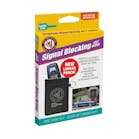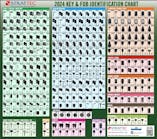Now and again new product announcements cross my desk which cause me to ask, "why didn't I think of that?" A new group of products by LockCaddy fits into that category. LockCaddy products are designed to simplify IC core pinning.
Wes McKenney, CRL, CIL, operates a business specializing in IC core cylinder servicing. Many of his jobs involve changing large quantities of IC cores. Out of necessity, McKenney devised a Service Station which he named LockCaddy. LockCaddy is designed by a locksmith for locksmiths. LockCaddy is made in America and is covered by U.S. patents and trademarks.
LockCaddy is made of tough ABS material with quality and durability in mind. Productivity is increased as IC cores can be kept in order during the combinating process. Three versions of LockCaddy are available: SFIC, LFIC and Conventional. Each LockCaddy contains cutout areas, (called Service Stations) for holding cylinders, stamping numbers, storing keys and for storage of tools and parts.
Small Format (SFIC LockCaddy)
Used for servicing popular small format IC cores such as Best, Falcon, Medeco and Arrow and many more. Two dumping stations are built-in for cylinders which have individually capped pin chambers. 6/7 cylinder lengths can both be accomodated. Slots for change keys are located next to each C core. Holders in LockCaddy can hold IC cores in position for stamping identification letters or numbers either on the face or side of the housings. Trays are included for holding screws, cams and springs. LockCaddy units are stackable for easy storage and for transporting IC core cylinders from work bench to job site. SFIC LockCaddy contains 23 Service Stations.
Large Format (LFIC LockCaddy)
Used for servicing popular large format IC cores such as Schlage, Corbin-Russwin, Yale, Sargent, Medeco and Assa. As with a SFIC LockCaddy, Service Stations can retain LFIC cylinders sideways or face up for number stamping. This allows identification numbers to be visible or not visible depending on owner requirements. Two Service Stations are designed to hold mortise cylinder housings. A second Service station can hold a stack of cut keys or key blanks. LFIC contains 23 Service Stations.
LockCaddy - Conventional
Used for combinating conventional mortise or key-in-knob cylinders. Service Stations are available for holding cylinders while combinating or carrying to job site. Other work stations can hold special cams or parts. A 'Pin Cover' Service Station facilitates pin cover removal. Cylinders can be held face-up or sideways for number stamping. LockCaddy Conventional contains 32 Service Stations.
HSR High Security Ring Kit
Many High Security lock cylinders contain a loose sidebar in addition to normal operating pins. Cylinders made by manufacturers such as Medeco, Schlage, ASSA and Mul-T-Lock allow the lock plug to be removed for combinating. "O" rings in the HSR-Kit can be used to hold the sidebar in place while combinating. A pointed tool is included. An "O" ring is first fitted over the pointed end of the tool to stretch the "O" ring into the proper diameter. The large end of the pointed tool is then fit against the end of the lock plug and the "O" ring is moved from the pointed tool onto the lock plug.
GatorRing
Special followers, called GatorRings, are included with each LockCaddy product. GatorRing products contain a colored "O" ring designed to firmly retain the follower in cylinder housings while combinating the lock plug. GatorRing models include: LC-Blue (.550 diameter for Corbin-Russwin), LC-Red (.500 diameter for Schlage), LC-Green (.490 diameter for Sargent) and LC-White (universal aligning tool). SFIC LockCaddy includes a LC-White GatorRing for aligning drive pins in SFIC housings. LFIC LockCaddy contains GatorRing tools as required.
Special lock tweezers, Part LC-TC5, are also available. LC-TC5 tweezers contain a cupped area at each tip designed to easily hold pins and springs during assembly procedures.
For more information contact your local locksmith distributor or: www.lockcaddy.com






